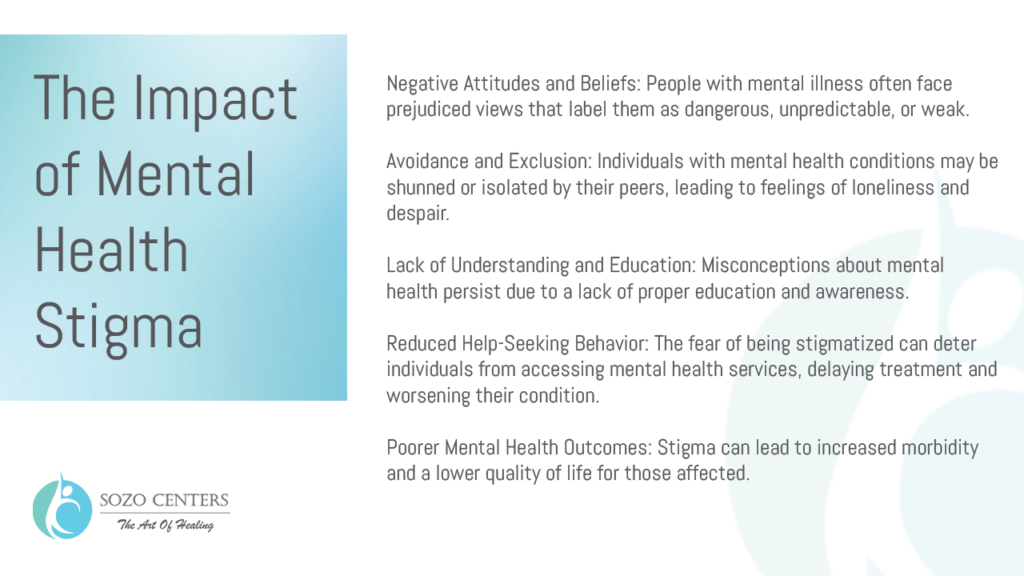
With over 15 years in the field of behavioral health, Psychiatric Mental Health Nurse Practitioner (PMHNP) Ron Tyree of Sozo Centers, has dedicated his career to helping individuals achieve lasting mental wellness. For Tyree, the path to psychiatry was deeply personal.
“I’ve always been drawn to understanding human behavior and finding ways to ease emotional pain. It started with a desire to help a family member struggling with mental health challenges, and it grew into a lifelong mission to support others,” Tyree explains.
His commitment to this field stems from an unwavering belief in the power of transformation. “Every individual has the capacity to heal. My role is to help them tap into their strength and guide them toward that potential,” he adds to emphasize the importance of creating environments where people can discuss mental health openly. Here, we’ll discuss mental health stigma and a holistic approach to care with Ron Tyree, but first, let’s talk about why this matters.
Looking for help with mental health issues? Reach out to the experts at Sozo and schedule an appointment today.
Understanding Stigma Surrounding Mental Illness

Mental health stigma refers to the negative attitudes, beliefs, and behaviors directed toward individuals with mental health conditions—and for those seeking help through therapy. This stigma can manifest in various ways, from subtle biases to overt discrimination, and it often leads to social exclusion and marginalization. For many, the fear of being judged or misunderstood prevents them from seeking the help they need, further exacerbating their mental health struggles.
The impact of mental health stigma is profound and far-reaching. It can lead to:
- Negative Attitudes and Beliefs: People with mental illness often face prejudiced views that label them as dangerous, unpredictable, or weak.
- Avoidance and Exclusion: Individuals with mental health conditions may be shunned or isolated by their peers, leading to feelings of loneliness and despair.
- Lack of Understanding and Education: Misconceptions about mental health persist due to a lack of proper education and awareness.
- Reduced Help-Seeking Behavior: The fear of being stigmatized can deter individuals from accessing mental health services, delaying treatment and worsening their condition.
- Poorer Mental Health Outcomes: Stigma can lead to increased morbidity and a lower quality of life for those affected.
Addressing mental health stigma is crucial for creating a more inclusive and supportive society. By using understanding and compassion, we can help individuals feel more comfortable discussing their mental health openly and seeking the care they need.
How Holistic Mental Health Care Creates Lasting Impact
Holistic mental health care focuses on treating the whole person—mind, body, and spirit—rather than just addressing symptoms. This comprehensive approach promotes sustainable healing and equips individuals with tools for lifelong wellness. Increasing mental health literacy can help build empathy, reduce stigma, and encourage open discussions about mental health issues, ultimately leading to a more supportive community.
Key Principles of Holistic Care
- Integration: Combining various modalities to create a well-rounded treatment plan.
- Example: Pairing therapy with yoga or mindfulness exercises.
- Using medical treatments alongside lifestyle education.
- Self-Awareness: Helping patients uncover the root causes of mental health challenges.
- Encouraging reflection on thought patterns, behaviors, and emotions.
- Empowering patients to make intentional changes for long-term growth.
- Community Support: Creating a network of resources to promote belonging and connection.
- Group therapy sessions.
- Peer support networks.
- Educational workshops.
Benefits of Holistic Care
This approach addresses the many facets of mental health, leading to lasting, meaningful improvements. Patients often experience:
- Enhanced Day-to-Day Functioning:
- Better emotional regulation.
- Increased energy and focus.
- Improved Relationships:
- Stronger connections with family, friends, and peers.
- A Renewed Sense of Purpose:
- Greater engagement in personal and professional pursuits.
- Motivation to contribute positively to their community.
Why Holistic Care Matters
The ripple effects of holistic care go beyond individual patients. By promoting sustainable healing, Sozo Wellness Center contributes to healthier families and communities. This comprehensive approach ensures that every patient is equipped with the tools and knowledge to thrive.
The Importance of Education and Awareness
Education and awareness are powerful tools in the fight against mental health stigma. By raising awareness about mental illness, we can challenge negative stereotypes and promote a more informed and empathetic perspective.
Raising awareness about mental illness can help to:
- Challenge Negative Stereotypes: Education can dispel myths and misconceptions, replacing them with facts and understanding.
- Promote Understanding and Empathy: Awareness campaigns can promote a sense of empathy and connection, encouraging people to support those with mental health conditions.
- Encourage Help-Seeking Behavior: When people understand that mental health issues are common and treatable, they are more likely to seek help early.
- Improve Mental Health Outcomes: Early intervention and proper treatment can lead to better mental health outcomes and a higher quality of life.
Effective awareness campaigns can be achieved through:
- Public Education Programs and Events: Workshops, seminars, and public talks can educate communities about mental health.
- Media Representation and Storytelling: Positive and accurate portrayals of mental health in the media can change public perceptions.
- Social Media Campaigns and Online Resources: Digital platforms can reach a wide audience, spreading awareness and providing valuable information.
- School-Based Education and Curriculum Development: Integrating mental health education into school curriculums can equip young people with the knowledge and skills to manage their mental health.
- Community-Based Initiatives and Partnerships: Collaborating with local organizations can create a supportive network for individuals and families.
By prioritizing education and awareness, we can reduce mental health stigma and create a more supportive environment for everyone.
Raising Awareness About Mental Illness
Evolving Approaches in Behavioral Health and Mental Health Services
Over the years, Tyree’s approach to patient care has evolved alongside advancements in psychiatric care and growing awareness of the importance of individualized treatment. Early in his career, Tyree noticed that traditional approaches often failed to fully address the unique needs of patients.
“As I gained experience, I realized that mental health care is not one-size-fits-all. Each patient brings their own story, history, and needs,” Tyree shares. “That’s why I’ve worked to develop a more personalized approach that integrates evidence-based treatments with compassionate, human-centered care.”
At Sozo Wellness Center, this philosophy guides every patient interaction. Whether it’s providing therapy, medication management, or alternative treatments, the goal is always to treat the whole person. “It’s about meeting people where they are and helping them move toward where they want to be,” Tyree says.
Debunking Mental Health Myths
Despite growing awareness, Tyree acknowledges that significant stigma and misconceptions still surround mental health treatment. “One of the biggest misconceptions I see is the belief that seeking help is a sign of weakness,” Tyree notes. “In reality, asking for support is one of the most courageous things you can do.”
Sozo Wellness Center addresses these misconceptions head-on by building a judgment-free, welcoming environment. Tyree emphasizes the importance of education in breaking down barriers. “We spend time talking with patients about what mental health care really involves, debunking fears and helping them feel empowered to take the next step.”
Another common myth Tyree works to dispel is the idea that medication is the only solution. “Medications like antidepressants and treatments like Spravato can be life-changing, but they’re just one part of the equation,” he explains. “We complement these options with therapy, lifestyle interventions, and holistic practices to ensure our patients receive well-rounded care.”
Bridging Evidence-Based Psychiatry with Holistic Care
As a thought leader in psychiatric care, Tyree is a strong advocate for balancing cutting-edge treatments like Spravato (esketamine) with holistic approaches. Spravato, which is FDA-approved for treatment-resistant depression, has shown promising results, but Tyree believes its success is maximized when integrated into a comprehensive care plan.
“Spravato has given hope to patients who felt they had run out of options. But it’s not just about the medication—it’s about the environment, the conversations, and the support surrounding it,” Tyree explains.
At Sozo Wellness Centers, patients receiving Spravato also have access to complementary therapies like mindfulness training, nutrition counseling, and stress-reduction techniques. “We want to treat the whole person—mind, body, and spirit. By doing so, we see better outcomes and lasting change,” Tyree adds.
He emphasizes that holistic care doesn’t mean choosing one approach over another. Instead, it’s about integrating the best of both worlds. “The evidence-based and the holistic aren’t in opposition; they’re partners in care,” he says.
Advocacy and Support
Building a support network is essential for individuals with mental health conditions, their families, and caregivers. A strong support network can provide the emotional and practical assistance needed to navigate mental health challenges.
A support network can offer:
- Emotional Support and Connection: Having someone to talk to and share experiences with can alleviate feelings of isolation and loneliness.
- Practical Assistance and Resources: Support networks can help individuals access mental health services, find information, and navigate the healthcare system.
- Advocacy and Empowerment: Support groups and advocacy organizations can empower individuals to speak up for their needs and rights.
- Education and Information: Providing accurate information about mental health can help individuals and their families make informed decisions.
A support network can be built through:
- Peer Support Groups and Online Communities: Connecting with others who have similar experiences can provide a sense of belonging and understanding.
- Family and Friends: Loved ones can offer invaluable support and encouragement.
- Mental Health Professionals and Services: Therapists, counselors, and other mental health professionals can provide expert guidance and care.
- Community-Based Organizations and Advocacy Groups: Local organizations can offer resources, support, and advocacy for individuals with mental health conditions.
- Online Resources and Hotlines: Digital platforms and hotlines can provide immediate support and information.
By building a robust support network, individuals with mental health conditions can feel more connected, empowered, and supported. This, in turn, can help to reduce stigma and promote mental health and well-being for all.
Building a Support Network
Advice for Those Considering Alternative Treatments
For individuals considering treatments like Spravato or exploring psychiatric care for the first time, Tyree’s advice is simple: Be open and take the first step.
“Trying something new can feel overwhelming, especially if you’re unfamiliar with psychiatric care. But the first step doesn’t have to be perfect—it just has to be taken,” Tyree advises.
He encourages patients to start by having a conversation with a trusted provider. “Talk openly about your concerns and goals. A good provider will listen, answer your questions, and help you explore options that align with your needs,” he says.
For those hesitant about alternative treatments, Tyree stresses the importance of education and self-compassion. “There’s no shame in seeking support, and no single path works for everyone. Be kind to yourself as you navigate this journey, and trust that there is help available,” he assures.
Moving Forward with Hope and Mental Health Awareness
Through his work at Sozo Wellness Center, Ron Tyree, PMHNP, continues to be a guiding force for patients seeking mental health care. His approach—grounded in empathy, evidence-based practices, and holistic care—offers a blueprint for healing and hope.
“Every patient teaches me something new, and every success reminds me why I started this journey,” Tyree reflects. “Mental health is about progress, not perfection. It’s about small, meaningful steps that lead to a brighter, more fulfilling life.”
For those considering their next step in mental health care, Tyree offers one final piece of advice: “Take it one day at a time, and don’t give up. Healing is possible, and you don’t have to do it alone.”
If you’re ready to take the first step in your mental health journey, Sozo Wellness Center is here to help. With a compassionate team and a commitment to comprehensive care, they’re ready to support you every step of the way whether in person or via telehealth. Visit Sozo Wellness Center to learn more about their services and schedule your first appointment today.
Can Sozo could help you? Reach out to our experts and schedule an appointment today.

